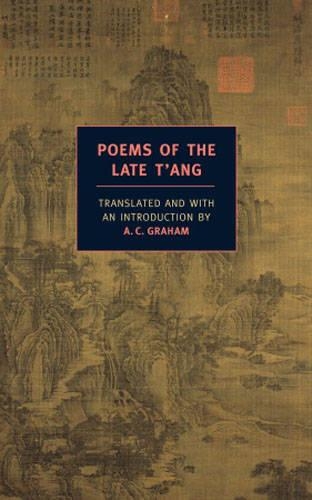
Poems Of The Late T'ang
(Paperback, Main)
Publishing Details
Poems Of The Late T'ang
By (Author) A. C. Graham
New York Review Books
NYRB Classics
15th February 2008
14th March 2008
Main
United States
Classifications
General
Non Fiction
895.11308
Physical Properties
Paperback
184
Width 125mm, Height 200mm, Spine 10mm
260g
Description
Classical Chinese poetry reached its pinnacle during the T'ang Dynasty (618-907 A.D.), and the poets of the late T'ang-a period of growing political turmoil and violence-are especially notable for combining striking formal innovation with raw emotional intensity. A. C. Graham's anthology of T'ang poetry begins with Tu Fu, commonly recognized as the greatest Chinese poet of all, whose final poems and sequences lament the pains of exile in images of crystalline strangeness. It continues with the work of six other masters, including the "cold poet" Meng Chiao, who wrote of retreat from civilization to the remoteness of the high mountains; the troubled and haunting Li Ho, the Chinese master of the uncanny, who, as Graham writes, cultivates a "wholly personal imagery of ghosts, blood, dying animals, weeping statues, whirlwinds, the will-o'-the-wisp"; and the shimmeringly strange poems of illicit love and Taoist initiation of the enigmatic Li Shang-yin. Offering the largest selection of these poets' work available in English in a translation that is a classic in its own right, Poems of the Late T'ang also includes Graham's searching essay "The Translation of Chinese Poetry," as well as helpful notes on each of the poets and on many of the individual poems.
Reviews
You never forget the moment you first encounter a book that turns out to be a treasure for life. Especially works that open up new worlds. I still remember buying Penguin's wonderful Late Tang Poetry at school Michael Wood, The Independent [UK]
The publication of Dr. Grahams Poems of the Late Tangis a welcome sign of the growing interest in Chinese poetry on the part of English-speaking readers and of the growing sophistication on the part of English-speaking readers and of the growing sophistication on the part of translators of Chinese poetry. Journal of the American Oriental Society
Angus Grahamwas the Wests chief authority on ancient Chinese philosophy and grammar. He was the sinologues sinologue in the sense that he understood the classical texts better than anyone else, but he was also a sensitive interpreter of poetry and philosophy for a general audienceHis translations of poetry seem to have been written for pure pleasure, but include some of the most difficult as well as the most beautiful Chinese poems. The Guardian [UK]
Angus Graham was widely recognized as the worlds premier authority on classical philosophy and linguistics, as well as a gifted translator of philosophy and poetry and a prominent exponent of the ancient Chinese view of life to the Western world. The Times [UK]
A "pioneering introduction. The Irish Times
Isn't A. C. Graham's Poems of the Late T'ang...a perfect book The Times [UK]
Author Bio
Angus Charles Graham (1919-1991) was born in Penarth, Wales. He studied theology at Oxford University and served as an interpreter in Malaya and Thailand while in the Royal Air Force. In 1946 he enrolled in the School of Oriental and African Studies in London, where he remained throughout his career. An important Sinologist, Graham is credited with introducing into English several little- or poorly-known works of Chinese classical literature and philosophy, and is celebrated for his insightful analysis of these texts. Among his books are translations of Lieh-tzu and Chuang-tzu; a partial reconstruction of the anti-Confucian writings of Mo-tzu and a study of Mahoism, Later Mohist Logic, Ethics, and Science; a comparison of Eastern and Western religions,The Disputers of the Dao; and Yin-Yang and the Nature of Correlative Thinking.
